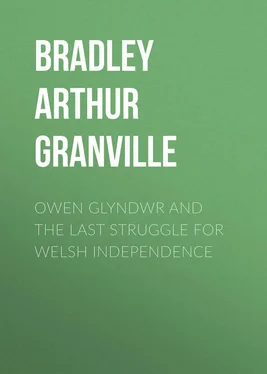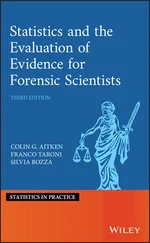Arthur Bradley - Owen Glyndwr and the Last Struggle for Welsh Independence
Здесь есть возможность читать онлайн «Arthur Bradley - Owen Glyndwr and the Last Struggle for Welsh Independence» — ознакомительный отрывок электронной книги совершенно бесплатно, а после прочтения отрывка купить полную версию. В некоторых случаях можно слушать аудио, скачать через торрент в формате fb2 и присутствует краткое содержание. Жанр: foreign_antique, foreign_prose, foreign_language, на английском языке. Описание произведения, (предисловие) а так же отзывы посетителей доступны на портале библиотеки ЛибКат.
- Название:Owen Glyndwr and the Last Struggle for Welsh Independence
- Автор:
- Жанр:
- Год:неизвестен
- ISBN:нет данных
- Рейтинг книги:5 / 5. Голосов: 1
-
Избранное:Добавить в избранное
- Отзывы:
-
Ваша оценка:
- 100
- 1
- 2
- 3
- 4
- 5
Owen Glyndwr and the Last Struggle for Welsh Independence: краткое содержание, описание и аннотация
Предлагаем к чтению аннотацию, описание, краткое содержание или предисловие (зависит от того, что написал сам автор книги «Owen Glyndwr and the Last Struggle for Welsh Independence»). Если вы не нашли необходимую информацию о книге — напишите в комментариях, мы постараемся отыскать её.
Owen Glyndwr and the Last Struggle for Welsh Independence — читать онлайн ознакомительный отрывок
Ниже представлен текст книги, разбитый по страницам. Система сохранения места последней прочитанной страницы, позволяет с удобством читать онлайн бесплатно книгу «Owen Glyndwr and the Last Struggle for Welsh Independence», без необходимости каждый раз заново искать на чём Вы остановились. Поставьте закладку, и сможете в любой момент перейти на страницу, на которой закончили чтение.
Интервал:
Закладка:
The Danes at this time began again to make attacks on Wales, but were defeated in Anglesey, and again in the Severn valley.
Flushed with victory, and without a particle of excuse, Griffith now turned upon South Wales, ravaged it with fire and sword, and drove out its new Prince, Howel ap Edwy. Howel, however, came back with an army of Danes and Saxons, so had times changed in Wales, but only to meet with disaster and defeat at the hands of the vigorous Griffith. Yet again the indomitable Howel returned with a fresh army to try his luck, and so certain was he this time of victory that he brought his wife to witness it. But again disaster overtook him, and his wife, instead of sharing his triumph, was carried off to share his conqueror’s bed.
Thus rolls on the tumult and the turmoil of the old Welsh story. The wonder is when and how the laws of the wise and peaceful Howel Dda found scope for application, and we can only suppose that the partial nature of these fierce struggles atoned in some measure for their continuity. Yet through all this devastation Church property, of which there was now a considerable amount and of a tangible kind, seems to have been well respected. The Danes alone were regardless of shrines and monasteries; and we hear of them at St. David’s and Llanbadarn and other sacred spots along the seacoast doing wild work.
The twenty years preceding the battle of Hastings were busy years in Wales, and the foremost name of that epoch in England came to be perhaps more dreaded among the native Welsh than that of any other Saxon since the days of Offa. But Harold, Earl of the West Saxons and commander of the English armies, got much deeper into Wales than Offa had ever succeeded in doing, and indeed came much nearer than any of his predecessors to a conquest of the country. Griffith ap Llewelyn, Prince of Gwynedd by right, and of all Wales by force, was, as we have seen, no mean soldier. He was Harold’s adversary, and the last Welsh Prince to face the Saxon power. This, the final quarrel of five centuries of strife, was, for a wonder, not of Griffith’s seeking.
We have seen how greatly modified the cleavage between the two peoples had by now become. Intermarriages had taken place in the higher ranks, alliances had been formed, and Saxon influences in matters such as land tenure and Church government had been sensibly felt beyond the Severn and the Dee. So now, while the shadow of the Norman invasion was hanging over unconscious England, Algar, Earl of Chester, falling out with King Edward, did nothing particularly unusual when he fled to the warlike son of the first Llewelyn, and tried to embroil him in his quarrel. Griffith was peacefully hunting at his second residence at Aber near Bangor, and had indeed made good use of a few years of peace, but he was not the man to turn a deaf ear to any prospect of a fight. The upshot was a very serious war, in which Griffith and his ally were for a long time singularly successful. They defeated Edwin of Mercia in a great battle near Welshpool; they afterwards took Hereford, won a victory at Leominster, and penetrated as far as Wiltshire.
A brief truce ensued with Harold, who had been opposing them, and then the struggle began afresh. The tables were now completely turned. Harold’s memorable invasion of Wales took place, in which he was assisted to success by the many enemies Griffith had made in his high-handed annexation of Deheubarth. The Welsh Prince, after a stirring reign of thirty-four years, perished during this campaign of 1061 at the hand of a hired assassin. His head, like that of many another Welsh leader, was sent across the border in a basket, and received at Gloucester by Harold with much demonstrative satisfaction. The latter, in the meantime, had marched to the Conway, and afterwards through South Wales. He had been victorious everywhere; and now nominated fresh rulers to the vacant thrones of Gwynedd and Deheubarth, under promise of vassalage to the English Crown.
The tenure of the three Welsh Princes was always complicated and, indeed, liable to fluctuation with the balance of power, both in Wales and across the border. In theory, Powys and South Wales owed lip homage and a nominal tribute to the Prince of Gwynedd as “Pendragon.” The latter, on behalf of Wales, owed a similar service to the King of England and, as I have mentioned before, was not inclined to dispute it so long as his independence was respected. Harold’s so-called conquest only altered matters to the extent of making the three Welsh provinces theoretically equal and individually vassals of the English Crown. This paper arrangement would have probably remained a dead letter or would have been maintained just so long as there was an arm strong enough to maintain it. But a people were coming to eliminate the Saxon as an aggressive power, and to take his place, – a people who would not be satisfied with lip homage and occasional tribute.
The great struggle in England between Norman and Saxon seemed by the mere force of contagion to set the Welsh Princes once more by the ears. Some of them, however, in accordance with their generous tradition of loyalty to the soil of the Britain they had lost, joined the West Saxons in their resistance to this new and formidable foe. Others essayed to make use in their domestic quarrels of the crafty Norman, who was only too glad to get a finger so cheaply into the Welsh pie.
The followers of William of Normandy, indeed, lost no time in turning their attention to Wales. Within ten years of the battle of Hastings, – almost immediately, that is to say, after the completion of the conquest of England, – they began their marauding expeditions across the border, and were not unnaturally surprised at finding themselves confronted by a people so entirely different from those they had just subdued. But these initial successes taught the Welsh nothing, and they still continued their fatal internecine strife.
The first serious lodgments of the Normans were made at Montgomery, where a baron of that name built the castle, whose fragments still look down from their rocky throne upon the windings of the upper Severn. Rhuddlan, at the mouth of the Clwyd, the site of an even then ancient fortress, was next occupied and strengthened. Flushed with their easy conquest of England, the Normans had already begun to regard Wales as if it also belonged to them; and still the quarrelsome Welsh chieftains continued to engage these formidable new-comers in their disputes. At Chester, Hugh Lupus, its Earl of famous memory, and the nephew of the Conqueror, held in secure confinement the person of the Prince of Gwynedd whom he had seized by treachery. He then proceeded to farm out the realm of the captive prince, but as he only received £40 as rental the sum is more eloquent than any words would be to express the nature of the hold he had won over it. It is more than likely the contractors had a bad bargain even at that figure.
In the conspiracy of 1075, when William was on the continent, many of the Welsh nobles joined, and had consequently their share of the hanging and mutilating that followed its discovery. Lupus, however, marched an army through the North and built or rebuilt castles at Bangor, Carnarvon, and Anglesey. He was closely followed by the Conqueror himself, who with a large force proceeded with little apparent opposition through the turbulent South, received the homage of its king, Rhys ap Tudor, and its petty Princes, and then repaired with great pomp to the cathedral of St. David’s, at whose altar he offered costly gifts. This kind of triumphal progress, as the Saxons well knew, though the Normans had yet to learn the fact, did not mean the conquest of Wales. King William in this single campaign seems to have imbibed some respect for Welshmen, for he spoke of them on his death-bed as a people with whom he had “held perilous conflicts.”
Читать дальшеИнтервал:
Закладка:
Похожие книги на «Owen Glyndwr and the Last Struggle for Welsh Independence»
Представляем Вашему вниманию похожие книги на «Owen Glyndwr and the Last Struggle for Welsh Independence» списком для выбора. Мы отобрали схожую по названию и смыслу литературу в надежде предоставить читателям больше вариантов отыскать новые, интересные, ещё непрочитанные произведения.
Обсуждение, отзывы о книге «Owen Glyndwr and the Last Struggle for Welsh Independence» и просто собственные мнения читателей. Оставьте ваши комментарии, напишите, что Вы думаете о произведении, его смысле или главных героях. Укажите что конкретно понравилось, а что нет, и почему Вы так считаете.












